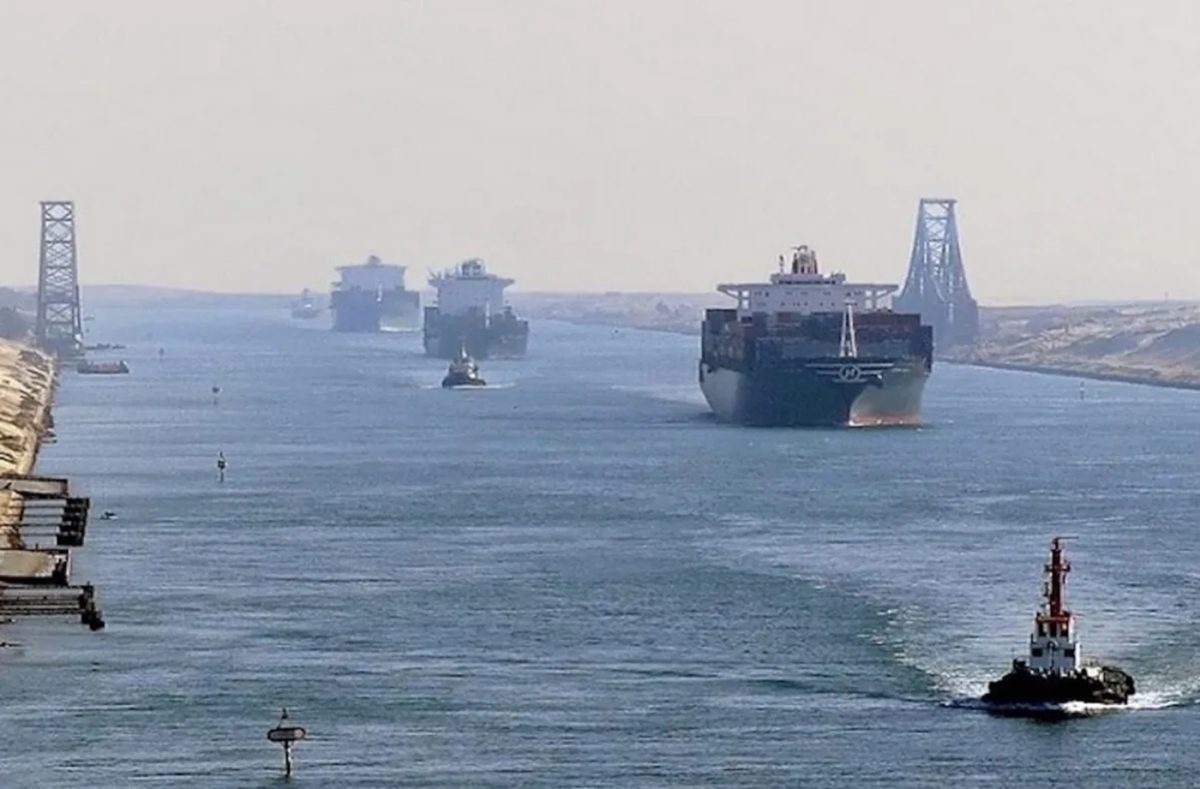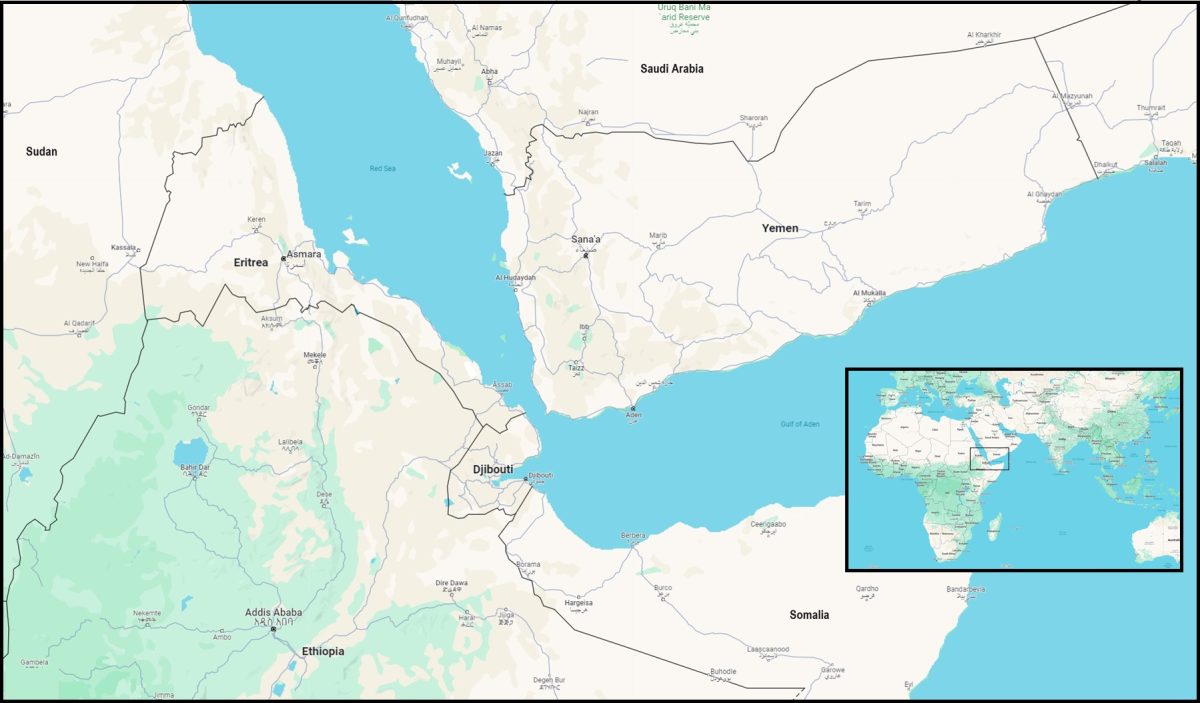
Some shipping companies are now avoiding the Red Sea and Suez Canal and are instead making the journey from Asia to Europe via the Cape of Good Hope in southern Africa, adding 10 to 14 days and millions of dollars of fuel to their journeys. Photo: Suez Canal Media Centre.
The White House has released a joint statement from the United States and 12 other nations, including Australia, warning the Houthi rebels in western Yemen to cease attacks against shipping in the Red Sea.
The statement by the governments of the US, Australia, Bahrain, Belgium, Canada, Denmark, Germany, Italy, Japan, Netherlands, New Zealand, Singapore and the UK goes further than an earlier 1 December United Nations Security Council statement condemning recent attacks against shipping and follows an emergency meeting of the UN Security Council on 3 January.
The Houthi rebels are effectively in control of western Yemen on the bottom corner of the Arabian Peninsula, and are believed to be provided with finance, weapons and intelligence by Iran.
Since the attacks against Israel by Hamas on 7 October and Israel’s response in Gaza, the Houthis have said they will attack any commercial vessels transiting the narrow Bab el-Mandeb strait and the southern Red Sea with links to Israel, regardless of where the vessel is flagged or how far in the past or future that vessel has or is scheduled to make a port call in Israel.
Since 17 October, there have been reports of at least 25 attacks where ships have been hijacked, hit by drones or anti-ship missiles, or have been attacked by small boats. In that time, US, British, and French naval vessels and aircraft have shot down dozens of missiles fired from Yemen and have sunk several small boats.
As a result of the attacks, some shipping companies, including the gigantic Maersk container line, have started diverting their vessels away from the Red Sea and Suez Canal and are instead taking the long way around the Cape of Good Hope at the bottom of Africa.
“Ongoing Houthi attacks in the Red Sea are illegal, unacceptable, and profoundly destabilizing. There is no lawful justification for intentionally targeting civilian shipping and naval vessels,” the joint statement reads.
“Attacks on vessels, including commercial vessels, using unmanned aerial vehicles, small boats, and missiles, including the first use of anti-ship ballistic missiles against such vessels, are a direct threat to the freedom of navigation that serves as the bedrock of global trade in one of the world’s most critical waterways.
“These attacks threaten innocent lives from all over the world and constitute a significant international problem that demands collective action.”
The statement says nearly 15 per cent of global seaborne trade passes through the Red Sea, including 8 per cent of global grain trade, 12 per cent of seaborne-traded oil and 8 per cent of the world’s liquefied natural gas (LNG) trade.
“International shipping companies continue to reroute their vessels around the Cape of Good Hope, adding significant cost and weeks of delay to the delivery of goods, and ultimately jeopardizing the movement of critical food, fuel, and humanitarian assistance throughout the world.
“Let our message now be clear: we call for the immediate end of these illegal attacks and release of unlawfully detained vessels and crews.
“The Houthis will bear the responsibility of the consequences should they continue to threaten lives, the global economy, and free flow of commerce in the region’s critical waterways. We remain committed to the international rules-based order and are determined to hold malign actors accountable for unlawful seizures and attacks.”

A map of the southern Red Sea and Gulf of Aden shows the Bab el-Mandeb strait choke point between the two busy waterways right alongside the Houthi-occupied country of Yemen. Image: Google Maps/Andrew McLaughlin.
Australia’s participation in the joint statement comes despite not being able or willing to contribute a naval vessel to a 10-nation task force to defend shipping in the region under Operation Prosperity Guardian.
The US, UK, France and other nations have destroyers and frigates deployed to the region, all of which are capable of shooting down drones and anti-ship missiles. The US Navy also has the aircraft carrier USS Eisenhower in the Gulf of Aden, and on 26 December, some of its Super Hornet combat aircraft successfully shot down Houthi missiles and drones.
On 31 December, a US Navy Seahawk helicopter from the destroyer USS Gravely engaged and sunk three small attack boats that were attacking and attempting to board the container ship, MAERSK HANGZHOU, which had earlier been hit by a Houthi missile.
In response to the sinking of the attack boats, Houthi spokesman Brig Gen Yahya Saree released a statement on Telegram saying, “Military movements in the Red Sea to protect Israeli ships will not prevent Yemen from performing its religious, moral and humanitarian duty in support and victory for the oppressed in Palestine”.
This is not the first time the US and other nations have had to use force against the Houthis. In 2016, the US launched cruise missiles at three Houthi-operated coastal radar sites in Yemen in response to attacks on shipping.
Retired US Army General Joseph L Votel, who oversaw that strike when he commanded CENTCOM from 2016 to 2019 and is now a distinguished senior fellow at the Middle East Institute, told Air & Space Forces Magazine, “The message is measured, as I would expect, but clearly highlights that there are consequences associated with continued attacks and that these nations will hold malign actors accountable.”
Whether the joint statement gives the Houthis pause for thought remains to be seen, although some analysts suggest its intent is to actually warn Iran about its support for the Houthis.
Original Article published by Andrew McLaughlin on Riotact.




